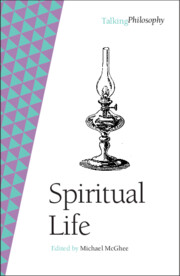Book contents
- Spiritual Life
- Talking Philosophy
- Spiritual Life
- Copyright page
- Contents
- Contributors
- Preface
- Introduction
- 1 Philosophy and Religion in the Thought of Kierkegaard
- 2 De Consolatione Philosophiae
- 3 The real or the Real? Chardin or Rothko?
- 4 Love and Attention
- 5 Descartes’ Debt to Augustine
- 6 Visions of the Self in Late Medieval Christianity: Some Cross-Disciplinary Reflections
- 7 Refined and Crass Supernaturalism
- 8 Religious Imagination
- 9 Moral Values as Religious Absolutes
- 10 Revealing the Scapegoat Mechanism: Christianity after Girard
- 11 Philosophy vs. Mysticism: An Islamic Controversy
- 12 Non-Conceptuality, Critical Reasoning and Religious Experience: Some Tibetan Buddhist Discussions
- 13 ‘Know Thyself’: What Kind of an Injunction?
- 14 Facing Truths: Ethics and the Spiritual Life
- Index
- References
5 - Descartes’ Debt to Augustine
Published online by Cambridge University Press: 18 April 2024
- Spiritual Life
- Talking Philosophy
- Spiritual Life
- Copyright page
- Contents
- Contributors
- Preface
- Introduction
- 1 Philosophy and Religion in the Thought of Kierkegaard
- 2 De Consolatione Philosophiae
- 3 The real or the Real? Chardin or Rothko?
- 4 Love and Attention
- 5 Descartes’ Debt to Augustine
- 6 Visions of the Self in Late Medieval Christianity: Some Cross-Disciplinary Reflections
- 7 Refined and Crass Supernaturalism
- 8 Religious Imagination
- 9 Moral Values as Religious Absolutes
- 10 Revealing the Scapegoat Mechanism: Christianity after Girard
- 11 Philosophy vs. Mysticism: An Islamic Controversy
- 12 Non-Conceptuality, Critical Reasoning and Religious Experience: Some Tibetan Buddhist Discussions
- 13 ‘Know Thyself’: What Kind of an Injunction?
- 14 Facing Truths: Ethics and the Spiritual Life
- Index
- References
Summary
Jonathan Edwards identified the central act of faith as ‘the cordial consent of beings to Being in general’, which is to say to God (see Holbrook, 1973, pp. 102ff). That equation, of Being, Truth and God, is rarely taken seriously in analytical circles. My argument will be that this is to neglect the real context of a great deal of past philosophy, particularly the very Cartesian arguments from which so many undergraduate courses begin. All too many students issue from such courses immunized against enthusiasm, in the conceit that they have answers to all the old conundrums, which were in any case no more than verbal trickery.
- Type
- Chapter
- Information
- Spiritual Life , pp. 117 - 143Publisher: Cambridge University PressPrint publication year: 2024



